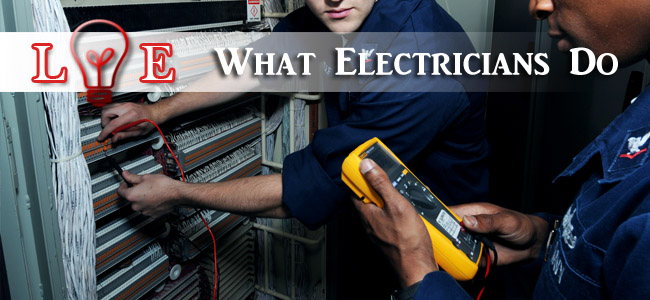Let’s take a look at what electricians do on a daily basis. Electricians will maintain and install all power and electrical systems for your home, factories, and businesses. They will also do this for control and wiring equipment that lets electricity flow. They will also maintain and install electrical machines and equipment in factories as well as other types of businesses.
Electrical Maintenance & New Construction
Electricians will normally just focus on either maintenance or construction electrical contracting work. Electricians that specialize in construction will normally install the wiring systems into homes, factories, and businesses. Those that specialize in maintenance will upgrade and fix the existing electrical systems and repair equipment. All electricians, which include emergency electricians must follow all local and state building codes as well as the National Electrical Code whenever they do work.
An electrician will begin by reading the blueprints. Blueprints are technical diagrams that will show where load centers, panel boards, outlets, circuits, and other equipment need to be. Once it has been determined where the wires and components need to go, the electrician will install and then connect the wires to circuit breakers, outlets, transformers, and other types of components and systems.
Whenever installing the wiring, electricians will often use hand tools like screwdrivers, knives, conduit benders, pliers, wire strippers, hacksaws, as well as power tools like saws and drills. Then they will use ammeters, voltmeters, ohmmeters, harmonics testers, and other electrical equipment to test the connections and ensure the safety and compatibility of the components.
What Do Electricians Fix?
Maintenance electricians will fix, replace or repair the electronic and electric equipment whenever it breaks. They will make the needed repairs and do so as quick as possible to minimize the inconvenience. They can replace things like switches, electronic and electrical components, wire, circuit breakers, or fuses.
Electricians will also inspect the equipment periodically to make sure that it is working right and to fix the issues before a breakdown happens.
Maintenance work does vary, and it depends on where the electrician works. Those who focus on residential work will do a variety of electrical work for just home owners. They could rewire homes, and replace old fuse boxes with new circuit breakers to help accommodate new appliances or they could install new lighting and other types of electrical items like ceiling fans. It is these electricians that may also do installation and construction work.
Where Do Electricians Work?
Electricians will normally work inside and outside, in homes, in businesses, in factories, and construction sites. The work could be quite strenuous and could include lifting heavy objects, stooping, standing, bending conduit, or kneeling for long periods of time. Electricians have a risk of being injured by electrical shock, cuts, and falls, and need to follow strict procedures for safety in order to prevent injuries. According to the US Bureau of Labor Statistics, full-time electricians have had a work related illness or injury at a rate that was higher than the national average. Whenever working outside, they could also be subjected to inclement weather. There are some electricians that must travel to job sites that are long distances away.
Many electricians will work a normal 40-hour week, even though overtime may be required. Those who are maintenance electricians could work nights or weekends and even be on call to go to a work site when needed. Those who are working in industrial settings will have some overtime during scheduled maintenance or during retooling periods. There are some companies that are open 24/7 and may have three shifts of electricians employed.
Education and Training that is Required
There are apprenticeship programs that will combine paid on-job training as well as classroom instruction. There are also joint training committees that make up local unions of the International Brotherhood of Electrical Workers as well as local chapters of National Electrical Contractors Association; local chapters of the Independent Electrical Contractors Association or Associated Builders and Contractors; as well as individual electrical contracting companies will have sponsored apprenticeship programs.
Due to the comprehensive training that is received, those who are able to complete the apprenticeship programs will be able to qualify to do both construction and maintenance work. The apprenticeship programs will last around 4 years. Every year will require at least 144 hours of classroom instruction and 2000 hours of on-job training. Within the classroom, apprentices will learn blueprint reading, electrical code requirements, first aid practices, safety practices, electrical theory, and mathematics. They may also get specialized training in communications, cranes, elevators, soldering, and fire alarm systems.
Certifications that are Needed
Many localities and states will require electricians to be licensed. Even though licensing requirements will vary, electricians will need to pass an exam that will test their knowledge of the National Electrical Code, state and local building and electric codes, as well as electrical theory.
Electrical contractors who work for the public, unlike those who work for electrical contractors will often need to have a special license. There are some states that require electrical contractors to have a certification as a master electrician. Many states will require master electricians to have 7 years or more experience as an electrician or a bachelor’s degree in either electrical engineering or a related field.

